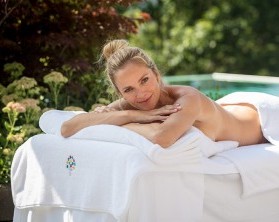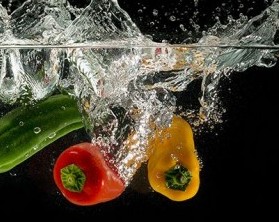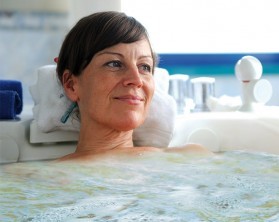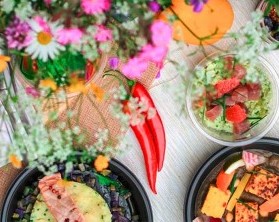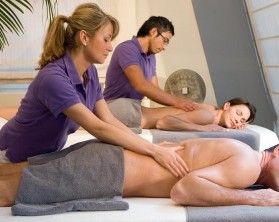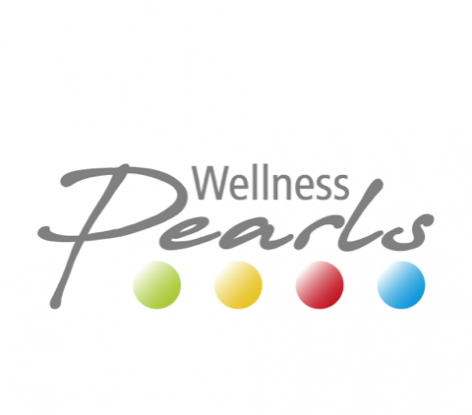Vegetarian & Vegan cooking

Our selection of offers on the topic
Vegetarian & Vegan Nutrition in the Wellness Hotel
Vegetarian & vegan nutrition in wellness hotels is more in demand than ever. Both forms of nutrition are booming. More and more people are deciding not to eat animals or even to do without animal foods altogether. Is this healthy? And can vegetarians or vegans even enjoy eating in the restaurant of a wellness hotel?
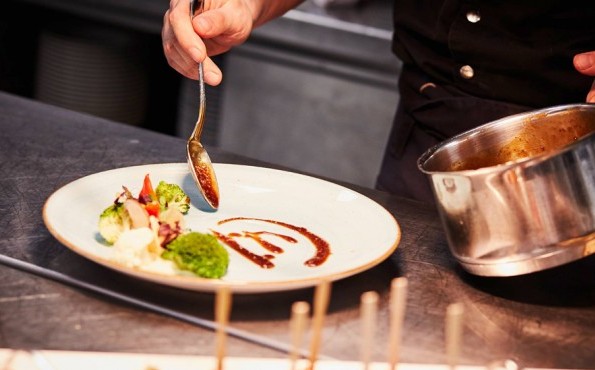
What is the difference between a vegetarian and vegan diet?
The difference between a vegan diet and a vegetarian diet is that vegans do not eat any animal foods. So they not only abstain from meat and fish, but also, for example, from:
- Cheese
- Milk
- Eggs
- Cream, yoghurt
- Honey
In some cases, vegans apply their attitude not only to their diet, but to their entire life. In this case, they also do not use clothing, furniture, cosmetics, etc. made of or containing animal products. From leather sofas to lipsticks with beeswax, they do without a lot.

Is a vegetarian and vegan diet healthy?
Vegetarian and vegan diets are healthy - provided you make sure that your body gets all the important nutrients. This is sometimes a little more complicated than with a mixed diet with dairy products or meat. However, anyone who has studied vegetarian or vegan nutrition in detail will quickly find a menu with delicious dishes that provide the body with good nutrition. Good sources of protein are legumes, for example. Vitamin B12 is usually provided by dietary supplements.
Vegetarian & Vegan Diet in the Wellness Hotel
While vegetarians and vegans often had a hard time finding appealing dishes without meat or animal products in restaurants and hotels a few years ago, today vegetarian dishes belong on every good menu.

The chefs of the Wellness-Hotels & Resorts can regularly take part in training courses on wellness-vitality cuisine. One of the focal points is vegan cuisine. Especially chefs who have been working in their profession for many years have often only marginally learned about vegetarian and vegan nutrition during their training. In the past, the training curricula simply did not see sufficient demand for cooking without animal products.
Regular further training ensures that the chefs in the Wellness-Hotels & Resorts pick up on current developments in the field of nutrition and know the latest scientific findings on healthy nutrition.
Eating vegetarian on a wellness holiday
The wellness holiday is also a good opportunity for all non-vegetarians to get to know vegetarian nutrition better. Whether at breakfast or at a stylish dinner with several courses: Here you can quickly see and taste how varied and delicious vegetarian dishes can be.
Those who want to delve deeper into the topic can look for nutritional advice and cooking courses at the wellness hotel.
Our Vegetarian & Vegan Nutrition-Tips for you
Carrot FaceNibble on 5 carrots a day - this will give your skin a great fitness program for the summer. The carrots contain beta-carotene - the vitamin prevents sun allergies. In addition, the skin gets a light golden tone.
Cold-pressed olive oil contains a lot of Vitamin E, which makes the skin particularly elastic. Simply pour some oil into hot water and use it as bath essence or footbath. For a good peeling, mix some salt and oil together and massage the mixture into your skin. Rinse it off afterwards. This will stimulate blood circulation and make you appear extra fresh.
Carrots are not only extremely good for the eyes, but also contribute to your general well-being. Simply indulge in carrots in the form of soup and your bowels will be happy again in no time at all.



